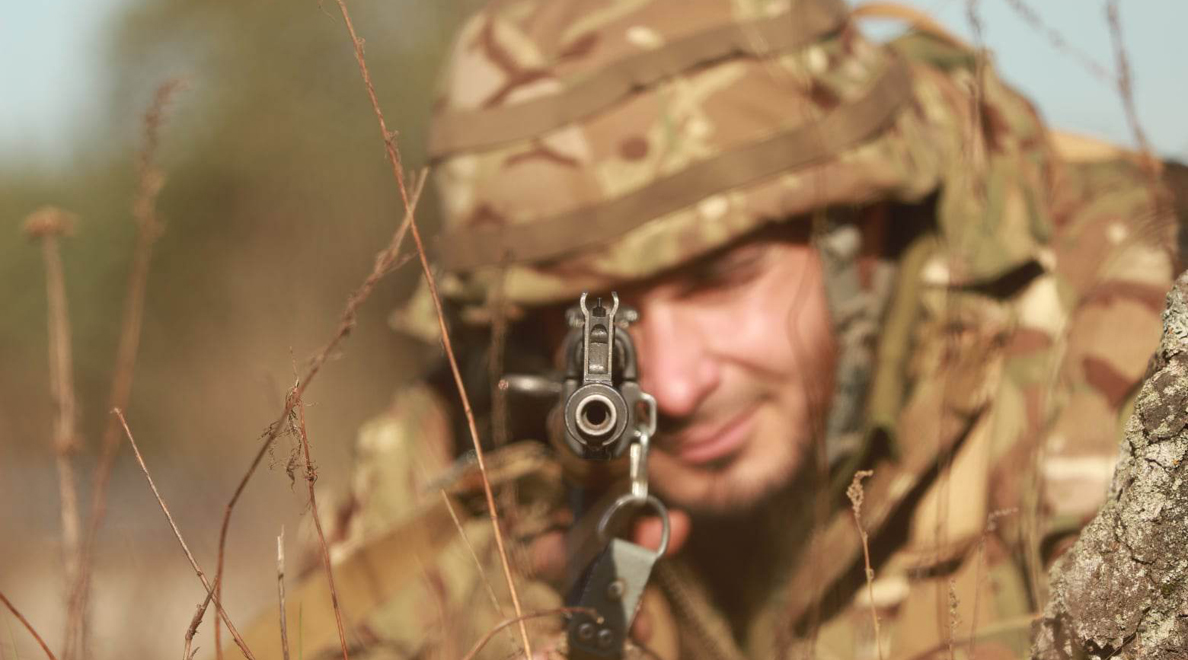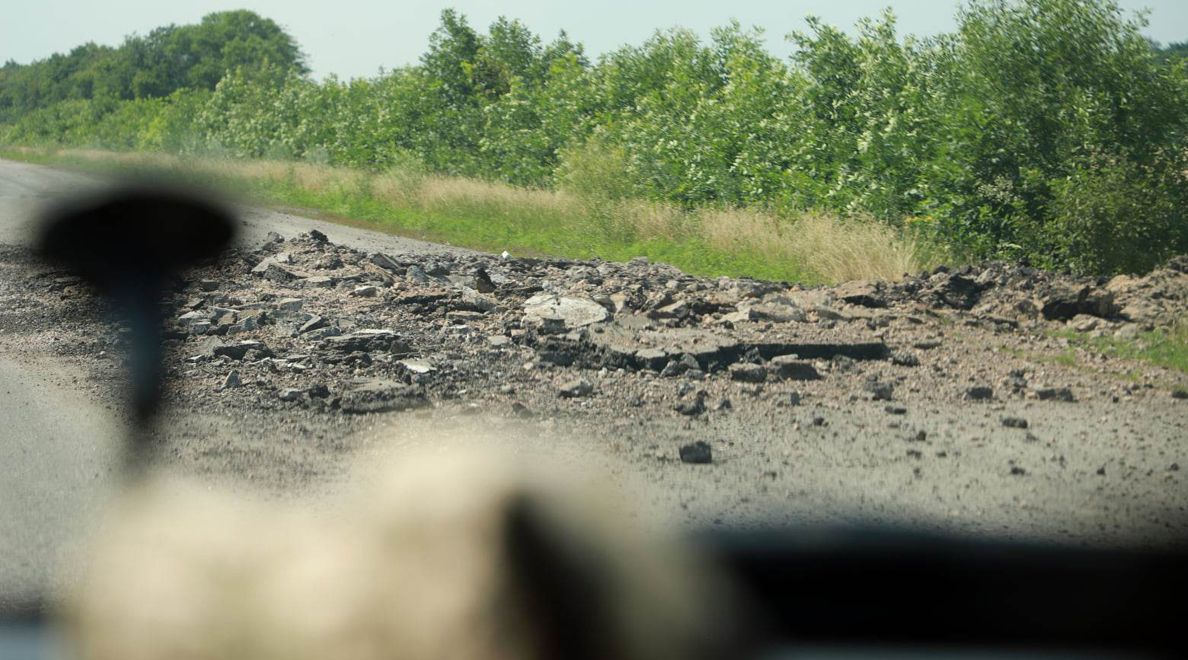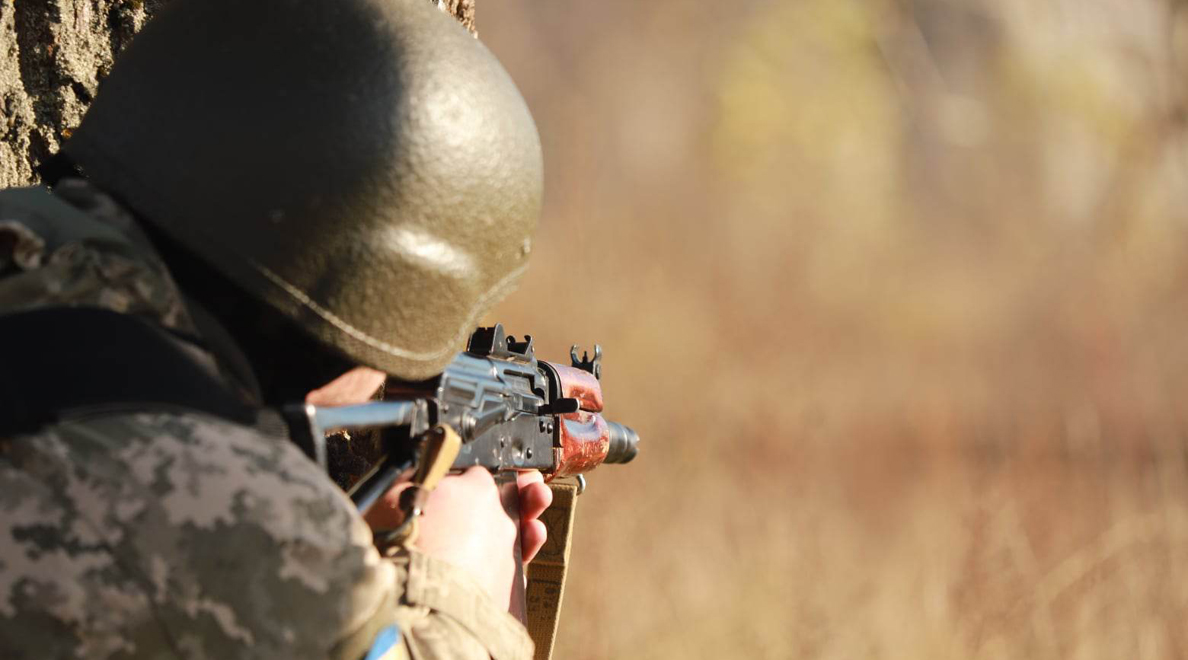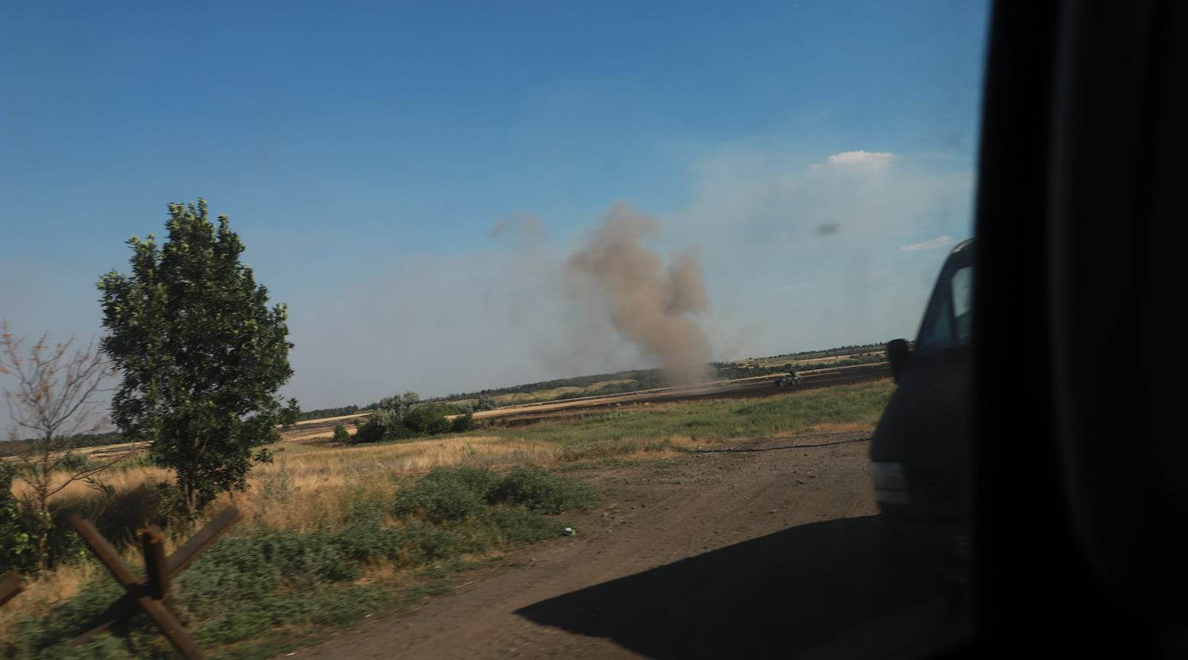Our team was heavily impressed by this interview. For many years, we have not met another person who would be so strong, bright, and optimistic. He has literally returned back to the world of living, having left a part of himself on the battlefield. Now he is looking forward to the completion of his treatment and rehabilitation, in order to be able to stand on his prosthetic legs and go back to the frontline. We present to your attention an intense combat story of Hennadiy, an Odesa-born Israeli citizen, a Ukrainian hero, a soldier in the International Legion for the Defense of Ukraine.
- How can we call you?
- My name is Hennadiy. I am a soldier in the International Legion within the Armed Forces of Ukraine.
- How did you join the International Legion?
- I crossed the border on 24th March 2022, with an intention of joining the Armed Forces of Ukraine and taking an active part in liberating the country. It was my exact purpose – to fight for the liberation of Ukraine. I was born in Odesa, which makes me a native Odessan, and as they say, there are no ex-Odessans.
Since 1990, I have been a citizen and resident of Israel. After we knew of the full-scale Russian invasion, the decision to come to Ukraine grew momentarily. On 24th March 2022, I crossed the border and arrived to my native city of Odesa. I went to a military recruitment center in a small town where my aunt lives, 60 km from Odesa. There was some confusion there, because they didn’t know what to do with me, an Israeli citizen volunteering for military service. Still, I got what I wished for. I’ve been sent to the International Legion.
I signed the contract in mid-July. In mid-August we were already on the frontline in Kharkiv region.
- How did your family react to your decision?
- I have been living in Israel since I was thirteen. I finished school and served in the army. Served as driver though, not in a combat unit. I have been married, then divorced. I have a grown-up daughter. My close people, relatives and friends understood my decision. I never hid my love for Odesa, my native city. I often spent vacations in Ukraine. As a rule, I visited Odesa twice a year. So, my decision was accepted without discussions. There was no room for debate. Everyone understood that there was no point in arguing.

- What did you do and what were you interested in prior to your service in the International Legion?
- After serving in the army, in 1996, I began to work as a truck driver. I used to deliver construction materials. Then I started my own business. I had my own truck. It was a calm and peaceful life.
I used to do sports. As many guys do, I was into boxing. But it was a long time ago.
- How did your service in the combat zone began?
- We arrived in Kharkiv region around the middle of August 2022. Gradually, our missions and raids became more and more serious, we were moving forward. The Legion fights on the frontline. I guess, it’s not a secret to anyone. From my personal experience, all the people I knew were highly motivated to fight and win. People coming from all around the world. The United States, France, Britain, Italy, post-Soviet countries… Actually, all soldiers in the Legion had a strong motivation to fight till victory, and nothing has changed since then.
- What do other legionnaires tell about their choice?
- 100% of the legionnaires are volunteers. These people are not interested in money. They came here voluntarily to fight for liberation of Ukraine.
TO THE CORE
- What do you remember the most from combat operations?
- It is too soon to go into details about combat operations. Our missions included reconnaissance. Different tasks, a broad range of them. I can just say that our legion always fought with honor.
There have been many bright moments. As regards combat operations per se, with time going by you stop paying much attention to them. You get adrenaline rush during the first operation, maybe during the second as well.
But, for example, here we are driving through a town. The kids are standing there waving the flags, shouting: “Slava Ukraini!” (Glory to Ukraine! – ed.) You know, it just touches you to the core. These things shouldn’t be happening. Children should not witness the kind of things that are going on now. It is disturbing and scary. I lived all my life with a war. In Israel, the war never actually stops. Still, seeing these kids, so sincere in their patriotism, waving Ukrainian flags… “Slava Ukraini!” – that was powerful! These are the moments I remember. And it’s not only me, but everyone paid attention to this.

- Did you have a chance to move forward and liberate territories?
- We do it almost constantly. This is our main mission. I serve in an assault company.
- How are you feeling during offensive operations?
- I think, the most important is the desire to achieve our goal. The desire to achieve victory. All other feelings and thoughts step aside.
- Fighting a war, especially a modern one, is difficult. Weapons and equipment are often new, high-tech and sophisticated. Adding combat stress to this mixture, how did you manage to cope with all of it? How were you capable to operate in such environment?
- Every job requires trained people who know how to do it. Our drone operators had their job to do, and the “Javelin” platoon had theirs. I had one of the simplest roles, as one might say, although it’s not exactly so. I am a driver and a shooter. I feel great when I drive a vehicle. Artillery shelling, shrapnel flying here and there, bumps on the road – all of that did not bother me. It’s okay.
And I learned to shoot long ago. In Israel everyone is more or less accustomed with weapons. Also, in my muscle memory I preserved some of the skills from my mandatory military service in Israel. Thus, almost from the start I got comfortable with assault rifle, machine gun and driving vehicles. I didn’t have any problems, and I was ready for all type of missions.
BEING A COMBAT MEDIC IS THE HIGHEST DEGREE OF VALOR
- You probably had to evacuate the wounded. Please tell about it.
- Yes, I had such experience. It was a difficult case. I remember it quite well. Risking your own life is one thing, and being responsible for somebody else’s life is quite different. I had been a medevac driver for two days when we got a wounded sapper. The man stepped on a landmine, and his foot was partially blown off. He was in pain, and he screamed dreadfully. So, I started driving. The distance to the hospital was 35 kilometers.
After 14 or 15 kilometers of drive, our car broke down. The wounded man was screaming all the time. We were in the center of a town. The gearbox and the clutch were broken. One more second, and I would have taken my rifle and stopped the first car moving down the road, because I was running out of options… Later I was told that if I had done that, it would have been in accordance with the law. But fortunately, I noticed that the car could still run on fourth and fifth gears. But it had to gain speed first. So, I managed to get the car up to speed on this incredible road. We made it to the hospital, the wounded guy survived. We got there almost by a miracle. As soon as we drove to the emergency room, the car stopped, and that was it. Still, I managed to get the wounded man to the hospital.
After this occasion, I said: I can do any kind of missions, however dangerous they are, but I am not driving medevac anymore. I cannot bear this responsibility. Emotionally, it was very hard. My personal conclusion is: being a combat medic is the highest degree of valor.

RECOVERING A DRONE: RALLY UNDER FIRE
- Military drivers have a lot of dangerous missions. In particular, delivering ammunitions or hazardous substances. Did you have such occasions?
- There were plenty of those. Personally, I was not involved in ammunition delivery, because I was with an assault team. We had other drivers to do that. But there were situations like, for example, when I was dispatched to help a drone team (and generally speaking, I do not get along well with technological equipment other than AK rifle). Our drone has been carried away by wind. It flew towards the enemy, to the other part of the village. So, we drove there. It was the two of us driving under fire. There were some burning fragments flying in the air, but I did not have a chance to take a closer look at them, since I was concentrated on driving. And we saved the drone, we managed to recover it.
- How expensive was that drone?
- Frankly speaking, I was primarily feeling sorry for my friend. He worried about it a lot. It was probably his second mission as UAV operator, and he was really nervous. I told him: “Ok, let’s go. It’s gonna be alright”. So, we drove there and recovered the drone.
- What role do UAVs and their operators have in this war?
- In my opinion, their role is quite significant these days. Drones are our eyes, our ears. And even more… Yes, they are very important, and we need a lot of professionals trained in this area. Naturally, we also need a lot of modern high-quality equipment.
THIS IS THE LEGION
- People, especially those serving in the military, have different “relationships” with weapons and equipment. Let’s take a look at your car as an example: it broke down completely, but only after you delivered the wounded soldier to the hospital. Did you ever get a feeling that “this piece of metal has a personality of its own”?
- I do get this feeling, and I get it all the time. There is a wide variety of vehicles around: Japanese, American, Korean, British… But I can’t remember a single episode when a vehicle would let us down, except that case with medevac. We have a top-notch mechanic in our team. He is very capable, and he’s got a lot of nerve. Being under any kind of fire, he can open the hood, do his thing, and then we are on the move again. This is the Legion…
- When you say these words, your face expression changes. Tell us about the atmosphere in the Legion.
- You can grasp the atmosphere in the Legion from this example. It’s four o’clock in the morning, we gather in the backyard to have a coffee and a cigarette. A Canadian says to a German: “Got a light?” The guy gives him a lighter, and he replies in Ukrainian: “Duzhe diakuyu”! (“Many thanks!” – Ed.) Then somebody else, coming from another end of the world, joins and greets everyone in Ukrainian: “Dobroho ranku!” (“Good morning!” – Ed.). I saw it happening many times.
A TRUE BATTLEFIELD COMMANDER
- What acts of your teammates do you remember the most?
- There was one case. I am not going into details about the mission and our objective. We had to spend a night in the wood. It was chilly. We did not have any camping equipment with us, since our initial plans were different. So, our team, including some newcomers from the US, had to sleep on the ground. And our team leader, who is a great guy (by the way, he is still in Ukraine; he is a Latvian citizen, and I have lots of respect for him) – he went to the nearest village, seven kilometers from there. Under fire, of course. There was a tank shooting at us, and something smaller as well, but it was the tank we remembered the most. So, our commander brought us a pile of blankets to keep us warm. This is a true battlefield commander.
RUSSIAN TANKS LAST NO LONGER THAN TWO DAYS
- People live through their first combat experience in different ways. What was happening with you from the moment you first heard incoming fire directed at you, to the moment you could act in a meaningful way? How much time did it take? For some people it is a matter of seconds, while others might need to spend months on the frontline to reach this point.
- Around two minutes after the first explosion. I simply needed to find a place where to take cover. Because it would be unwise to stand and wait for a missile to hit you. But I do not recall any emotional outbursts, apart from willing to fight, and an urge for a cigarette, of course… I got comfortable pretty soon. I believe, 34 years of life in Israel leave their mark. Explosions and shooting are a constant thing there. We are used to it. So, when I heard a tank shot for the first time, my reaction was: “Wow. And what are we going to do about it?” And that was it, basically. I don’t remember it well, even don’t remember where it happened.
- What happened to the tank shooting at you?
- As far as I know, all Russian tanks which had been shooting at us, were destroyed either the same day, or two days after. We are talking among ourselves, and with other recon guys. We get the rumors, like: “We’ve been harassed by a tank”. – “Oh, no worries, it has already been burnt”. It’s not even three days. Usually, it takes up to two days.
- What does a tank mean for you personally?
- It is an enemy unit that needs to be destroyed as soon as possible. By any means. With its crew, or without it, but it needs to be destroyed fast.

DISSATISFACTION AFTER THE FIGHTING ENDS
- Which type of incoming fire was the most terrifying for you personally?
- All of them are unpleasant. You get shot at, you hear this whistling sound, it’s understood. But I don’t remember anything I could call truly “terrifying”.
- How are you feeling after the fighting ends?
- It depends. Sometimes you feel dissatisfaction. I would call it a “half-finished glass” feeling. Sometimes it’s like: “Is it finished? Ok, let’s go then”. No strong feelings. We always returned from the missions with a clear conscious. We knew that we completed our mission. That’s like how a man feels when going home after a work shift: “Alright, it’s finished, let’s go home”. Nothing else. If we were in close proximity to the enemy – that would be more interesting. We would go look for some trophies. Search here and there, and that’s all.
- What did you desire the most in between the missions?
- Different things. Depending on our location. If we were in Kharkiv, I would likely want to go for a walk in the city. No one really restricted us. But most of all I wanted to go back to the frontline. We used to sit down together, drink coffee and talk. People would share their impressions. Snipers, drone guys, our team – everybody shared their stories. That’s how it was. Did I have any particular wishes? When we were on the frontline, I wanted to stay there. And if we left for a week or two – from what I saw myself, the soldiers just wanted to come back. At least, that’s the way it was in our team.
THERE SHOULDN’T BE ENEMY TANKS IN FRONT OF SCHOOLS
- What motivated you?
- I could not imagine back then, and I cannot imagine it now, that there might be an enemy tank standing in front of my school No. 68 in Odesa. It is some kind of science fiction. For me, there is no difference, would it be a tank or a UFO. That’s it. I was ready to do everything it takes to prevent this from happening. And I am still ready to do everything it takes.
MOVING TOWARDS THE VICTORY, EVEN ON PROSTHETIC LEGS
- What are your current plans?
- Current plans are very simple. In order to start rehabilitation and have prosthetics, all of my wounds need to heal first. So I keep waiting. My stitches have been removed today. I wait for everything to heal. Then I start rehabilitation, I start walking on prosthesis, and then I return back to my unit. Of course, I am not likely to be a good assault trooper, let alone a machine gunner. But we will figure something out. We will continue advancing, continue pushing forward. This is not negotiable.
- How do you manage to keep this optimism and strength of mind?
- I wouldn’t say that I put some special effort in it. We are not going to stop until we reach the victory. There is no way that we stop. We will continue moving forward till the victory.
ENEMY EVALUATION IS A TASK FOR FORENSIC EXAMINERS IN A MORGUE
- Did you make your assessment of the enemy? Watching them in a gunsight, or listening to the intercepted radio communications, or judging by the aftermath of their stay on the occupied territories? What can you say of the Russian invaders?
- That is an interesting question. Once we had a chance to assess the enemy when we were in Kupiansk. We seized some warehouse – I don’t know what it was, some hangar filled with ammunition, but a special type of ammunition. Gas spray, shields, batons – police equipment to be used against the civilians. Our first impression was: what kind of army is that? Who came here to fight us? What were they thinking about? There were lots of bullets and grenades, but when we saw these police shields and tear gas, I got really angry.
And the other case was when we seized a lot of trophies, new AK rifles. Probably, from some SOF troops. Of course, we felt ourselves proud: we have beaten some special team.
Generally speaking, why should we bother evaluating the enemy? We have to kill them. They will be evaluated by forensics examiners, and we have a different job to do.
THE ENEMY IS PATHETIC
- What can you say of the Russian invaders based on what you’ve seen in combat?
- I can say that they do not make a decent adversary. If they do not have numeric superiority of at least ten to one, they will try to avoid the fight. They will either retreat, or shoot, disperse, and then flee. I wouldn’t say their motivation is strong. I don’t know, maybe it’s different somewhere else. But judging from our experience, I don’t see the Russians as a strong motivated adversary.
WITH BAYONETS FIXED
- There were firefights in the forest belts between the fields. Here is our forest belt, and theirs is across the field. I heard two bullets flying past me. We shot back – and that was it, they retreated.
- My last combat, when I got blown up on a mine, we seized the enemy trenches, which was our main objective. Moreover, we fixed our bayonets because we wanted to go hand-to-hand with them. We’ve been told that it’s “Wagner” mercenaries, and we wanted to check it out… But they fled. Just like that.
- Tell us about this incident, please.
- We had been tasked with assaulting the enemy trenches. I was rushing ahead recklessly and forgot to look down and watch my step. Actually, I noticed the mine that blew me up, but it was too late. It was a MON mine standing on a wooden stump. I saw it, I leaped forward, and then the explosion came. And that was it. There was a small firefight, our guys ran forward, while I crawled back.
PAINFUL WAY TO SAFETY
- It was a heavy injury. What happened next?
- I remember crawling on my arms, shouting: “Medic! Medic!” in all languages. It was painful. The medic couldn’t hear me, he was far ahead up the trenches. And there was an intense firefight going on. Some shrapnel landed in my back and in my stomach, although I don’t remember it. I crawled on my arms for a long time. My face was covered with blood. I could not figure out how many eyes I still had left.
When I crawled out from this trench into a sunflower field, I heard people speaking Ukrainian. It meant that they were from another brigade, not from the Legion. I don’t remember who this man was, but I clung to him and said: “Get me out of here”. They put me on the stretchers and carried me for a long time. I remember somebody saying: “I’m tired, let’s take turns”. It was a long way. Then they loaded me onto the vehicle. Based on the track sound, it was probably an MTLB. They drove me on this MTLB. Then I was loaded in a BTR. We drove a long way in this BTR. We drove fast, the driver did a good job. Then a medevac took me to the hospital. Then I don’t remember anything, I woke up in a hospital in Kharkiv. That’s the whole story in a nutshell.
I remember the guy who tore my shirt apart. At some moment I felt these black snowflakes. I remember it well. It’s like you dive into cold water, and you fall asleep… It was very cold. He tore my shirt apart and put his hand on my chest. I remember the warmth of this hand and how I came up to the surface again. Probably he saved my life at that moment.
- What advice would you give to the guys who are now in training before going to combat? What to pay attention to?
- I would recommend them to watch their step. To the extent the situation allows it, of course.
CHILDREN SHALL NEVER WITNESS A WAR
- What is the most important in the war and in peaceful life?
- The most important thing in the war is not to lose self-control under any circumstances, that’s first and foremost. And the second most important element is your teammate going next to you. These two elements – they are paramount. And all the rest will come.
In peaceful life, the most important thing is never to get to know what war is. And what is even more important is for children never to see this nightmare and not to have to grow up during the war, not even for a second. Only clear and peaceful sky above their heads. I think this is the most important.
- Would you like to send greetings to anyone?
- Without naming any names, I would like to wish my commanding officers in the Legion to stay the way they are. We feel very confident with them. This is very important.
- How is this war going to end, in your opinion?
- Naturally, it will end with our victory. It is not debatable. This is a fact. In any case, we are going to win.
And one more thing… Wait for me, my friends. I’ll be back!
Volodymyr Patola
Photos provided by the author
